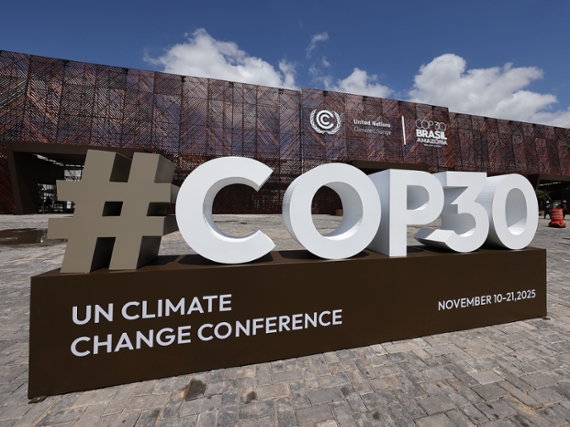|
|
 
 |
| (Wagner Meier/Getty Images) |
Climate negotiations at COP30 in Brazil have shifted beyond their initial focus on implementing previous commitments as negotiators acknowledge a major gap between current national plans and what is needed to meet global temperature goals. Influenced by mounting urgency and political signals from Brazilian President Luiz Inacio Lula da Silva, delegates are calling for more robust action on emission reductions and increased financial support for vulnerable nations. The conference chair is now considering an end-of-session communiqué that could reflect this elevated ambition.
|
|
|
|
|
AI is transforming retail, but most retailers are unprepared. Join EPAM, Stripe, and commercetools on November 12 at 12 PM EST to learn how AI is redefining the shopper journey and why composability is key to responsible adoption. Register now to build an AI-ready commerce foundation. |
|
|
|
|
|
 
The UN Security Council is scheduled to vote on a US-proposed resolution that supports President Donald Trump's peace plan for Gaza and seeks an international force to stabilize the territory. The vote, scheduled for Monday evening, follows extensive negotiations and revisions to the draft. The resolution has garnered support from several Muslim-majority and Arab countries, but faces opposition from Russia, which has proposed a separate draft focused on a two-state solution without international force deployment or the establishment of a transitional governing body. Israeli Prime Minister Benjamin Netanyahu has reiterated his steadfast opposition to the formation of a Palestinian state, emphasizing that his position remains unchanged despite mounting international and domestic pressure. |
|
|
|
|
Facing labor gaps and high customer demands, retailers can innovate operations with mobile technology—enabling real-time insights, contactless payments, digital receipts, and loyalty programs. Dive into this paper to see how mobile solutions can enhance retail operations and engage shoppers. |
|
|
|
|
|
 
|
The UN High Commission for Refugees is leveraging a "route-based approach" to address the overlapping but distinct challenges faced by refugees and migrants. While both groups often travel along the same paths, they have different needs, the UNHCR warns as it works to counter public misconceptions and policy trends that treat all people on the move as a single group. "Refugees can't go home. Migrants: They may not want to go home, but they can go home without suffering persecution or war," says UNHCR Director of International Protection Elizabeth Tan.
|
|
|
| Free eBooks and Resources |
|
 
|
The UN marks the first World Cervical Cancer Elimination Day today, highlighting that a woman dies every two minutes from cervical cancer -- a disease that is largely preventable and treatable. The World Health Organization aims to eliminate cervical cancer by 2030 through a "90-70-90" strategy: vaccinating 90% of girls against human papillomavirus by age 15, screening 70% of women by the time they are 35 (and again at 45) and treating 90% of women with cervical disease.
|
|
|
| |
 |
| (Chuchart Duangdaw/Getty Images) |
New modelling by the ARC Centre of Excellence for 21st Century Weather and Australia's science agency indicates that heatwave conditions will not return to pre-industrial levels for at least a thousand years after the world achieves net zero emissions -- challenging common perceptions that the climate will quickly improve once the target is reached and highlighting the need for long-term adaptation. The research also indicates that every five-year delay in achieving net zero between 2030 and 2060 will significantly worsen the severity and frequency of heatwaves.
|
|
|
|
AI is reshaping the global economy by rapidly boosting the profits and market values of major technology companies, but most developing countries -- especially the least developed, landlocked and small island states -- are falling behind in the AI revolution, Deodat Maharaj, managing director of the UN Technology Bank for the Least Developed Countries, writes. These countries face challenges, including lack of access to digital tools, unreliable infrastructure and a lack of skilled personnel, that put them at risk of further marginalization as other countries move ahead with AI-driven advancements, Maharaj warns.
|
|
|
| | |
